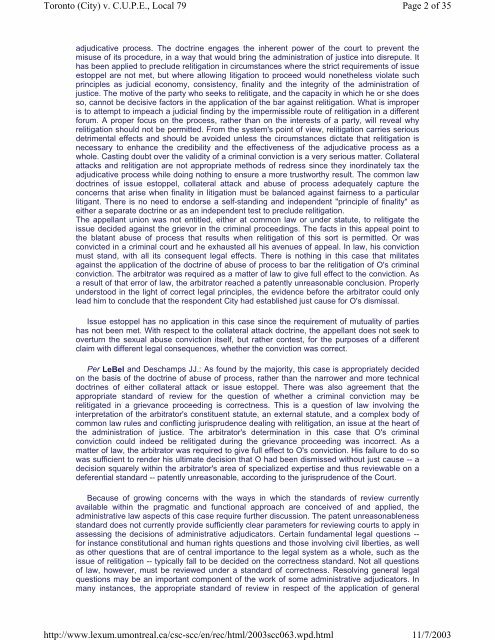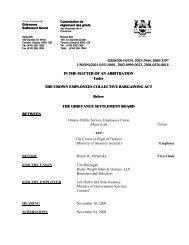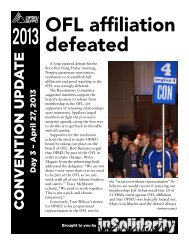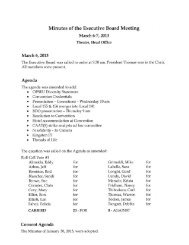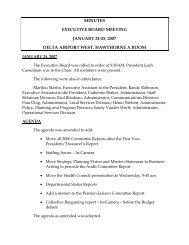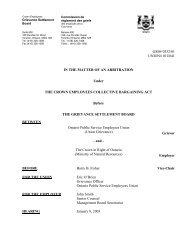C.U.P.E., Local 79 v. Toronto (City) .pdf - OPSEU
C.U.P.E., Local 79 v. Toronto (City) .pdf - OPSEU
C.U.P.E., Local 79 v. Toronto (City) .pdf - OPSEU
You also want an ePaper? Increase the reach of your titles
YUMPU automatically turns print PDFs into web optimized ePapers that Google loves.
<strong>Toronto</strong> (<strong>City</strong>) v. C.U.P.E., <strong>Local</strong> <strong>79</strong><br />
http://www.lexum.umontreal.ca/csc-scc/en/rec/html/2003scc063.wpd.html<br />
Page 2 of 35<br />
11/7/2003<br />
adjudicative process. The doctrine engages the inherent power of the court to prevent the<br />
misuse of its procedure, in a way that would bring the administration of justice into disrepute. It<br />
has been applied to preclude relitigation in circumstances where the strict requirements of issue<br />
estoppel are not met, but where allowing litigation to proceed would nonetheless violate such<br />
principles as judicial economy, consistency, finality and the integrity of the administration of<br />
justice. The motive of the party who seeks to relitigate, and the capacity in which he or she does<br />
so, cannot be decisive factors in the application of the bar against relitigation. What is improper<br />
is to attempt to impeach a judicial finding by the impermissible route of relitigation in a different<br />
forum. A proper focus on the process, rather than on the interests of a party, will reveal why<br />
relitigation should not be permitted. From the system's point of view, relitigation carries serious<br />
detrimental effects and should be avoided unless the circumstances dictate that relitigation is<br />
necessary to enhance the credibility and the effectiveness of the adjudicative process as a<br />
whole. Casting doubt over the validity of a criminal conviction is a very serious matter. Collateral<br />
attacks and relitigation are not appropriate methods of redress since they inordinately tax the<br />
adjudicative process while doing nothing to ensure a more trustworthy result. The common law<br />
doctrines of issue estoppel, collateral attack and abuse of process adequately capture the<br />
concerns that arise when finality in litigation must be balanced against fairness to a particular<br />
litigant. There is no need to endorse a self-standing and independent "principle of finality" as<br />
either a separate doctrine or as an independent test to preclude relitigation.<br />
The appellant union was not entitled, either at common law or under statute, to relitigate the<br />
issue decided against the grievor in the criminal proceedings. The facts in this appeal point to<br />
the blatant abuse of process that results when relitigation of this sort is permitted. Or was<br />
convicted in a criminal court and he exhausted all his avenues of appeal. In law, his conviction<br />
must stand, with all its consequent legal effects. There is nothing in this case that militates<br />
against the application of the doctrine of abuse of process to bar the relitigation of O's criminal<br />
conviction. The arbitrator was required as a matter of law to give full effect to the conviction. As<br />
a result of that error of law, the arbitrator reached a patently unreasonable conclusion. Properly<br />
understood in the light of correct legal principles, the evidence before the arbitrator could only<br />
lead him to conclude that the respondent <strong>City</strong> had established just cause for O's dismissal.<br />
Issue estoppel has no application in this case since the requirement of mutuality of parties<br />
has not been met. With respect to the collateral attack doctrine, the appellant does not seek to<br />
overturn the sexual abuse conviction itself, but rather contest, for the purposes of a different<br />
claim with different legal consequences, whether the conviction was correct.<br />
Per LeBel and Deschamps JJ.: As found by the majority, this case is appropriately decided<br />
on the basis of the doctrine of abuse of process, rather than the narrower and more technical<br />
doctrines of either collateral attack or issue estoppel. There was also agreement that the<br />
appropriate standard of review for the question of whether a criminal conviction may be<br />
relitigated in a grievance proceeding is correctness. This is a question of law involving the<br />
interpretation of the arbitrator's constituent statute, an external statute, and a complex body of<br />
common law rules and conflicting jurisprudence dealing with relitigation, an issue at the heart of<br />
the administration of justice. The arbitrator's determination in this case that O's criminal<br />
conviction could indeed be relitigated during the grievance proceeding was incorrect. As a<br />
matter of law, the arbitrator was required to give full effect to O's conviction. His failure to do so<br />
was sufficient to render his ultimate decision that O had been dismissed without just cause -- a<br />
decision squarely within the arbitrator's area of specialized expertise and thus reviewable on a<br />
deferential standard -- patently unreasonable, according to the jurisprudence of the Court.<br />
Because of growing concerns with the ways in which the standards of review currently<br />
available within the pragmatic and functional approach are conceived of and applied, the<br />
administrative law aspects of this case require further discussion. The patent unreasonableness<br />
standard does not currently provide sufficiently clear parameters for reviewing courts to apply in<br />
assessing the decisions of administrative adjudicators. Certain fundamental legal questions --<br />
for instance constitutional and human rights questions and those involving civil liberties, as well<br />
as other questions that are of central importance to the legal system as a whole, such as the<br />
issue of relitigation -- typically fall to be decided on the correctness standard. Not all questions<br />
of law, however, must be reviewed under a standard of correctness. Resolving general legal<br />
questions may be an important component of the work of some administrative adjudicators. In<br />
many instances, the appropriate standard of review in respect of the application of general


